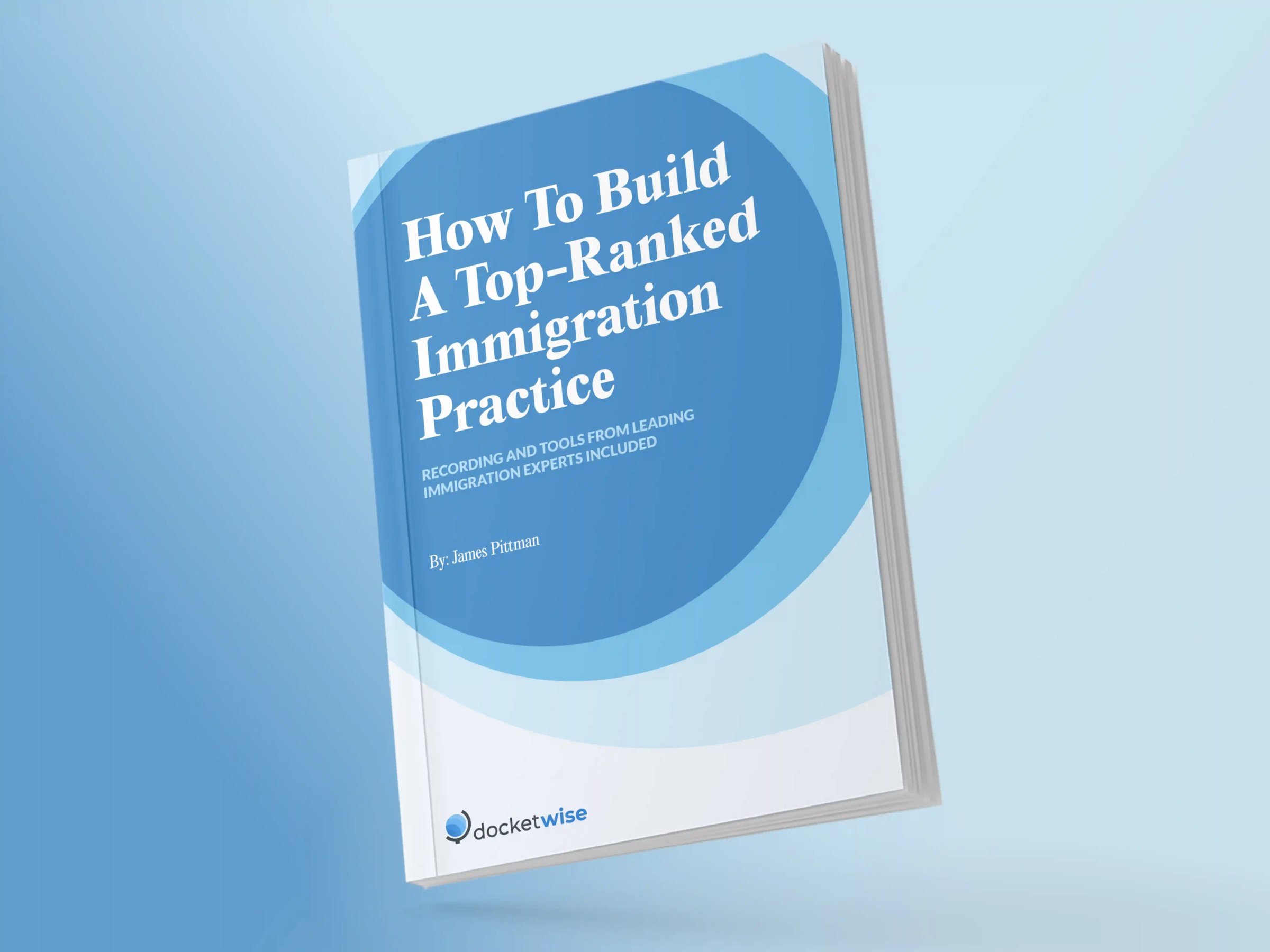Starting anything new is overwhelming, and it may be hard to decide what exactly you need in order to take on your new venture. Luckily, you usually need much less than you think, even when your new venture is a family-based immigration law practice.
We recently hosted a webinar on building a successful family-based immigration law practice, and we wanted to follow up on that webinar with this article that dives into some of the topics discussed during the webinar and introduces new ideas as well. If you’re just getting started with your law firm or simply want to refresher on some important, fundamental topics, this article is for you.
And the reality is that there are thousands of immigration lawyers currently practicing in the US. So if you want to be more than just a name, your first step in building a successful family-based immigration practice is to set yourself apart from the very start.
How can you do that?
Well, there are two high-level principles to keep in mind as well as some specific things you can do to get on the path to success with your family immigration law practice. So let’s dive into some of these high-level principles first and then explore specific best practices.
Build your firm centered around client success and trust
The absolute first thing you should think about is who your ideal clients are and their greatest needs. Is your ideal client someone from a particular part of the world that cares about an attorney who speaks their language? Is your ideal client someone who is looking to file a certain type of case that you specialize or want to specialize in?
After all, your job at the end of the day is helping your clients succeed, and so in order to set your practice apart, it’s important that you create a firm that focuses on your clients’ success first and foremost.
Once you’ve determined your ideal client and what problem you want to solve for them, you have to build your clients’ trust. In an article on building client trust, Thomson Reuters lists five ways to build client trust:
setting proper expectations,
responding to client communications,
making your client feel like you’re in the trenches with them,
being a great, ethical attorney, and
advocating for them.
At the end of the day, you have to make sure that your client feels safe with you and truly believes that you will take care of them and their case. Even if you can’t achieve a positive result in their case, a client that feels like their attorney has done everything they could may still come out happy with the representation, even if they aren’t happy with the legal outcome.
Relationships are key when establishing your family-based immigration practice
There are two ways to approach building relationships - locally and in person, and virtually and outside of your local area.
First, looking at the local approach, it’s important to take stock of what immigrant communities may be close to where you live and work. Best case scenario, knowing or sharing the language and culture of these communities can give you an edge in offering your services there.
On the other hand, if there are immigrant communities that can benefit from your services that you may not have much in common with, you can still try and establish a relationship with them by going to community events, providing free value, learning their language, and so on.
At the end of the day your firm is your business, so don’t rule out reaching out to any and all immigrant communities that could benefit from your work.
Next, let’s take a virtual and geographically broader approach. There are so many ways to put yourself out there and make yourself available, whether through your website, a Facebook page, online webinars and more. Since immigration is a federal practice, you can represent clients in all 50 states and around the world.
But prospective clients won’t reach out to you if they don’t know how, so it is important that you provide clear contact information, and instructions on how to reach out to you, and give clients multiple options for how to contact you, such as via social media, WhatsApp, your website, an email address and perhaps even a phone number. And if you have a physical office and take walk-in clients, sharing your address can work too.
One specific hack is joining and being active on Facebook groups. There are seemingly endless Facebook groups centered around languages, ethnic backgrounds, countries of origin and more attributes that you can join and add value to by answering immigration questions that may come up, offering free tips and news updates and more. Be prepared for lots of connection requests and direct messages with questions if you do it right!
There are also immigration lawyer Facebook groups where you can ask questions and connect with others in the field, like Nerdy Immigration Lawyers, an active group with over 5,000 members where immigration professionals ask and answer questions and share insights.
If you’re looking for something more formal, the American Immigration Lawyers Association is a nationwide voluntary association of immigration lawyers with numerous local chapters which focuses on providing immigration-specific professional education and practice development resources to help lawyers build their practices and share their knowledge.
Finally, once you’ve successfully worked with a few clients, you can start taking advantage of the best marketing tool any immigration lawyer could have: word of mouth referrals.
Getting a word-of-mouth referral automatically builds rapport and establishes a relationship between you and your prospective client, which is a powerful way to build your practice. Ask your clients to recommend you to others who may need your help, and take care of every next client that comes in just as you did the previous one. Immigrant communities are very close-knit and referrals from friends and family carry a lot of weight.
The things you need (or don’t need) to run a successful family-based immigration practice
It’s easy to think you need expensive tech tools and a huge office space to seem like a legitimate family-based immigration practice, but the truth is that you don’t. Yes, it’s important to look professional, but it’s more important to focus on being genuinely helpful, listen to clients, and provide solutions they can easily put into action.
So here are a few things to consider when starting your family-based immigration practice that will likely help you succeed.
Do you really need an office?
Ideally, yes, having a physical office can be great for your law practice. Offering in-person consultations makes a difference to many clients, especially because immigration is deeply personal. So if you can, receive your clients in-person as much as possible.
However, a traditional office with a traditional lease may not be necessary anymore. You can have a desk at a co-working space and then use a closed-door office when you need to see clients in person. Alternatively you can share office space with another, perhaps more established firm that has a traditional office. Oftentimes law firms with empty desks or offices are open to sub-leasing them to solo or small attorneys, which can also be a win-win since you can end up co-counseling or otherwise working with that law firm.
And of course in the end, you can also have a fully virtual practice. In 2021 and beyond, with so many people becoming more and more comfortable discussing serious matters on video, having a virtual law firm with no office is possible too. One recommendation here, though, is to be clear about this to your prospective clients. Some people may still prefer to see their attorney in person, so be prepared to either make arrangements for that or turn those clients away.
Ultimately, make sure your clients feel comfortable, whatever your setup. Because if your clients aren’t comfortable, it’s going to be hard for them to trust you, and as you know, trust is one of the most important facets of the attorney-client relationship.
Liability insurance is essential
You need liability insurance in order to protect yourself against malpractice claims. In some states, it’s even required by the bar to buy liability or malpractice insurance. You can check malpractice insurance requirements by state on the American Bar Association’s website, and double check that your policy has litigation support in case of a claim. Do your homework and don't go with the first liability insurance policy you find - shop around and get a policy that fits you and your practice.
Technology is a must in 2021 and beyond
If you’re just starting your firm or looking for ways to make your existing firm more successful, maximizing your use of appropriate tech tools is a must. And we don’t just mean case management platforms - that’s a given. There are a number of other technologies you can leverage to streamline or automate every part of your business. Let’s explore just a few of them.
Google Workspace is very user friendly, and makes it simple to register a domain name and then set up your firm’s email address accordingly. If you want to make a simple and clean website, web hosting platforms like Wordpress and Squarespace have inexpensive plans for businesses that will allow you to build a professional, polished site and connect it with your Google Suite add-on for email and other tools like Good Docs, Sheets and Calendar.
Client communication is important too. Giving your cell phone to clients is a personal decision, but if you don't feel comfortable sharing your personal digits, set up a business-only phone number. Voice over IP (VOIP) services can be a simple, inexpensive way to set up a phone number without getting a landline. Google Voice is an option here too if you’re already in the Google universe.
Managing your finances is crucial to running a successful family-based immigration practice. Unless you’re also a CPA, it’s probably a good idea to talk to an accountant to go over your options for managing your firm’s finances. Getting bookkeeping and invoicing software like Quickbooks can help you stay on top of your billing and keep all your clients in the same place, and invoicing with tools like LawPay allow you to stay compliant with ABA regulations, manage IOLTA accounts and more.
In fact, Docketwise has integrations with multiple platforms for accounting and credit card processing, including Quickbooks and LawPay. The integration with LawPay creates a link for payment when your invoices go out, giving clients options to pay either on the client portal or through the link sent with the invoice. Payments reflect on the Docketwise invoice and are visible as transactions in the user’s LawPay account. The integration with QuickBooks is available on Docketwise Suite and Docketwise Enterprise versions. Creating an invoice in Docketwise creates a corresponding invoice in QuickBooks, and so when payments are recorded for bills in Docketwise, Docketwise Suite or Enterprise will push the completed transactions to Quickbooks for easy bookkeeping.
Docketwise can help you manage your family-based immigration practice
While the start of your own practice may be a “season of hustle,” make sure you take time to set up your practice the right way from the start. You can only be at your best for your clients when your firm is effective and working for you, not against you.
We designed Docketwise to help you do just that.
From a full library of immigration forms to client questionnaires in multiple languages to an industry-leading set of API integrations, we help you stay up to date on all your cases, communicate easily with your clients, and otherwise build and manage your firm. If you want to learn more about Docketwise, schedule a demo at the link below, or sign up for our Immigration Briefings newsletter for daily and weekly immigration updates!
Unlock Your Success as an Immigration Lawyer.
Download Now
About the author
James E. Pittman is a distinguished immigration attorney, co-founder of DocketWise, and Director and Subject Matter Expert (SME) in immigration at Docketwise, a leading platform delivering purpose-built solutions for legal and accounting professionals. A former patent attorney, he later built a highly regarded U.S. immigration practice and is a sought-after CLE educator on immigration law and ethics. James is admitted in NY, NJ, before the USPTO, and hosts the DocketWise video podcast Immigration Uncovered.

